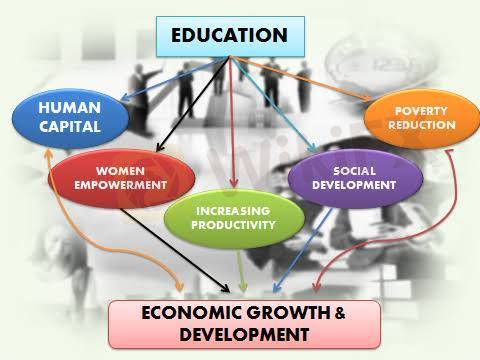
2025-02-14 17:24
IndustryThe role of education in economic development
#firstdealofthenewyearastylz
Education plays a crucial role in economic development by fostering human capital, increasing productivity, and promoting innovation. Here are some key ways in which education contributes to economic growth:
1. Enhancing Human Capital
Education equips individuals with skills and knowledge, making them more productive and efficient in their work.
A well-educated workforce attracts investment and promotes industrial growth.
2. Increasing Productivity and Wages
Educated workers tend to be more productive, leading to higher wages and improved living standards.
Skilled employees can adopt and implement new technologies effectively.
3. Encouraging Innovation and Entrepreneurship
Education fosters critical thinking and problem-solving skills, essential for innovation.
Higher education institutions drive research and technological advancements, which fuel economic progress.
4. Reducing Poverty and Income Inequality
Education provides individuals with better job opportunities, helping to break the cycle of poverty.
It helps reduce economic disparities by enabling people from different backgrounds to access quality employment.
5. Strengthening Institutions and Governance
An educated population is more likely to participate in democratic processes and demand transparency.
Good governance and strong institutions contribute to stable economic environments.
6. Facilitating Economic Diversification
A well-educated workforce enables economies to diversify into high-value industries such as technology, finance, and healthcare.
It reduces dependence on agriculture or raw materials, making economies more resilient to external shocks.
7. Attracting Foreign Direct Investment (FDI)
Countries with a skilled workforce attract multinational companies looking for educated employees.
FDI brings capital, technology, and expertise, accelerating economic growth.
8. Improving Health and Social Outcomes
Education leads to better awareness of health practices, reducing healthcare costs and increasing life expectancy.
Educated individuals contribute more to social stability, reducing crime rates and social unrest.
Conclusion
Investing in education is one of the most effective strategies for long-term economic development. Governments and policymakers should prioritize access to quality education, vocational training, and lifelong learning opportunities to build a skilled workforce and sustain economic growth.
Like 0
FX1618501564
Trader
Hot content
Industry
Event-A comment a day,Keep rewards worthy up to$27
Industry
Nigeria Event Giveaway-Win₦5000 Mobilephone Credit
Industry
Nigeria Event Giveaway-Win ₦2500 MobilePhoneCredit
Industry
South Africa Event-Come&Win 240ZAR Phone Credit
Industry
Nigeria Event-Discuss Forex&Win2500NGN PhoneCredit
Industry
[Nigeria Event]Discuss&win 2500 Naira Phone Credit
Forum category

Platform

Exhibition

Agent

Recruitment

EA

Industry

Market

Index
The role of education in economic development
 Hong Kong | 2025-02-14 17:24
Hong Kong | 2025-02-14 17:24#firstdealofthenewyearastylz
Education plays a crucial role in economic development by fostering human capital, increasing productivity, and promoting innovation. Here are some key ways in which education contributes to economic growth:
1. Enhancing Human Capital
Education equips individuals with skills and knowledge, making them more productive and efficient in their work.
A well-educated workforce attracts investment and promotes industrial growth.
2. Increasing Productivity and Wages
Educated workers tend to be more productive, leading to higher wages and improved living standards.
Skilled employees can adopt and implement new technologies effectively.
3. Encouraging Innovation and Entrepreneurship
Education fosters critical thinking and problem-solving skills, essential for innovation.
Higher education institutions drive research and technological advancements, which fuel economic progress.
4. Reducing Poverty and Income Inequality
Education provides individuals with better job opportunities, helping to break the cycle of poverty.
It helps reduce economic disparities by enabling people from different backgrounds to access quality employment.
5. Strengthening Institutions and Governance
An educated population is more likely to participate in democratic processes and demand transparency.
Good governance and strong institutions contribute to stable economic environments.
6. Facilitating Economic Diversification
A well-educated workforce enables economies to diversify into high-value industries such as technology, finance, and healthcare.
It reduces dependence on agriculture or raw materials, making economies more resilient to external shocks.
7. Attracting Foreign Direct Investment (FDI)
Countries with a skilled workforce attract multinational companies looking for educated employees.
FDI brings capital, technology, and expertise, accelerating economic growth.
8. Improving Health and Social Outcomes
Education leads to better awareness of health practices, reducing healthcare costs and increasing life expectancy.
Educated individuals contribute more to social stability, reducing crime rates and social unrest.
Conclusion
Investing in education is one of the most effective strategies for long-term economic development. Governments and policymakers should prioritize access to quality education, vocational training, and lifelong learning opportunities to build a skilled workforce and sustain economic growth.
Like 0
I want to comment, too
Submit
0Comments

There is no comment yet. Make the first one.

Submit
There is no comment yet. Make the first one.